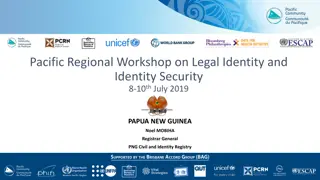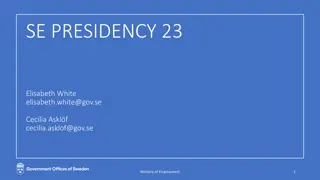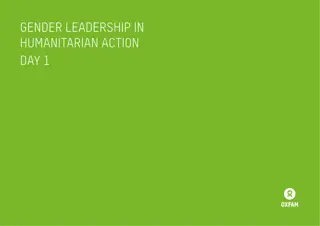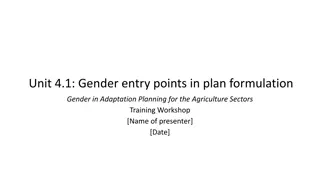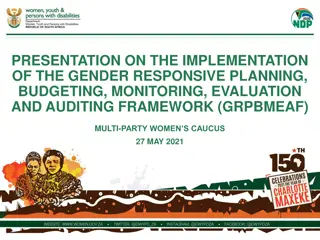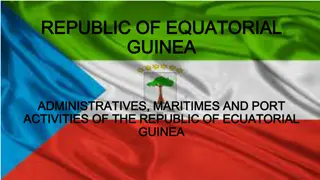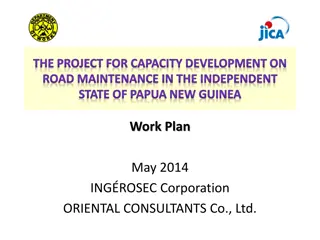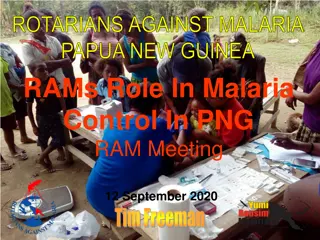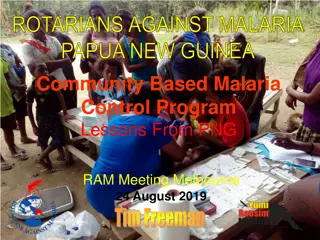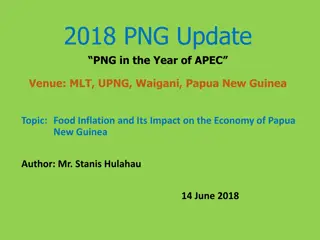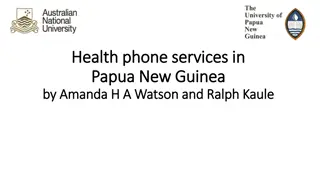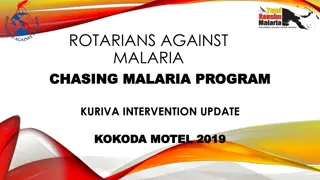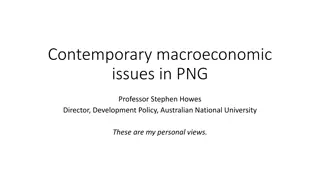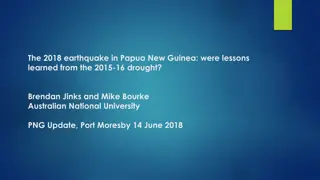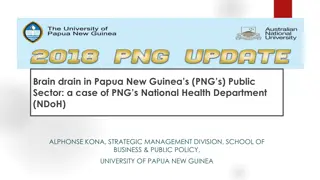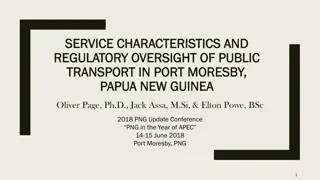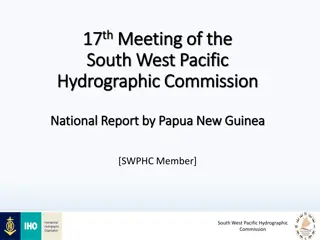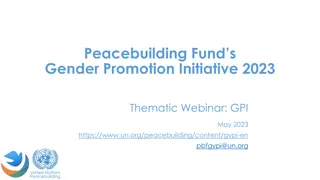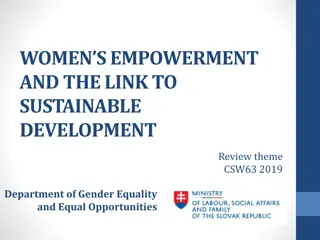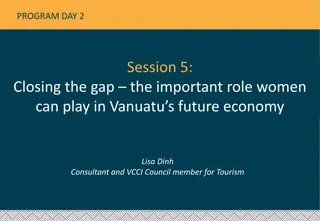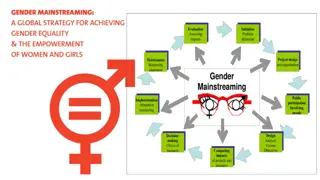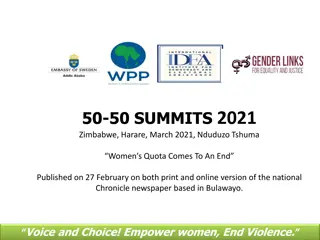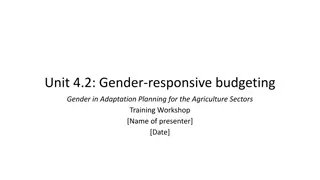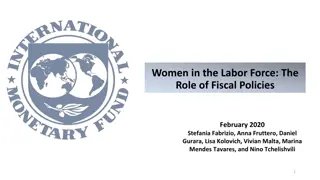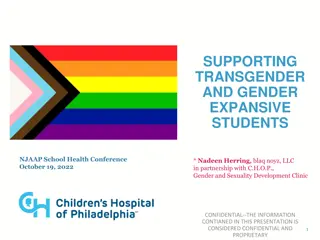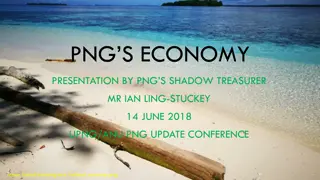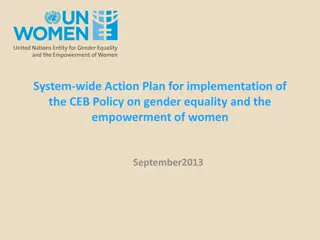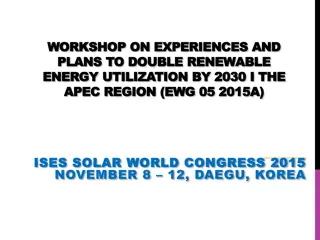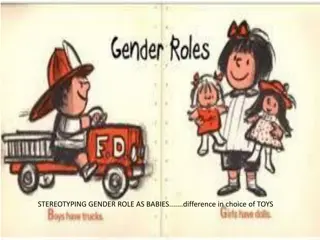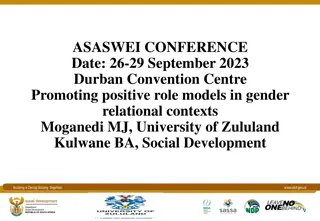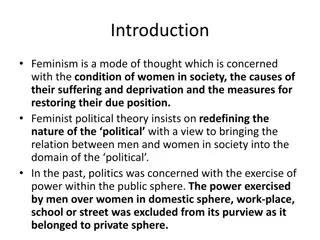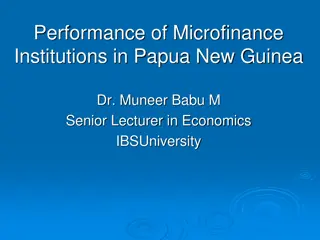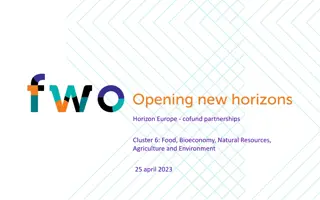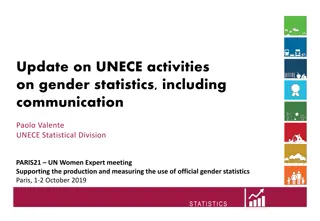Promoting Gender Equality and Political Participation in Papua New Guinea through APEC Partnerships
The presentation delves into the background of women's political participation in Papua New Guinea, highlighting the low representation of women in politics. It explores the potential role of APEC in fostering greater gender equality and political involvement in the region. The briefing also emphasizes the importance of gender inclusiveness within APEC initiatives and provides recommendations for promoting women's leadership in PNG.
Download Presentation

Please find below an Image/Link to download the presentation.
The content on the website is provided AS IS for your information and personal use only. It may not be sold, licensed, or shared on other websites without obtaining consent from the author. Download presentation by click this link. If you encounter any issues during the download, it is possible that the publisher has removed the file from their server.
E N D
Presentation Transcript
AN ALTERNATE VIEW: PROMOTING EQUALITY & POLITICAL PARTICIPATION THROUGH APEC PARTNERSHIPS GEEJAY MILLI 2018 PNG UPDATE UNIVERSITY OF PAPUA NEW GUINEA 15THJUNE 2018
PRESENTATION OVERVIEW 1. Brief background to women s political participation in Papua New Guinea 1. Brief background to gender inclusiveness of APEC 1. Research methodology 1. Research question: An alternate view - How can APEC be an effective avenue to foster greater equal gender political participation in PNG? 1. Some findings and recommendations
1. Background to womens political participation and leadership in Papua New Guinea PNG s short contemporary political history: In seven years, there have been seven (7) women political representatives in parliament In the past decade there has been an increase in women representatives at the local level governments and slightly in the national government In the 2017 general election 163 women stood as candidates, none were elected
Table 1 Women in national elections, 1964-2017 ` General Elections Number of Women Candidates Number of Women Elected 1964 3 0 1968 1 0 1972 4 1 1977 10 3 1982 17 1 1987 18 0 1992 16 0 1997 55 2 2002 75 1 2007 105 1 2012 135 3 2017 163 0 (Sepoe 2002) 1964-1997; (Meki, 2015) 2002 & ( Wood 2017) 2007-2017
2. Brief background to gender inclusiveness of APEC Gender analysis is an important component of the APEC approach to the integration of women in the mainstream of activities and processes. It is a methodology to: 1. Identify and understand the differences in the lives of women and men, and the diversity among women themselves i.e. in their varied circumstances, responsibilities, social relationships and status within existing economic, social, cultural, environmental, institutional and political structures in any community or economy; 2. Assess how policies, programs or projects may impact differently on women and men, girls and boys; 3. Compare how and why women and men are affected through the collection and utilization of sex-disaggregated data, both qualitative and quantitative; 4. Integrate gender considerations throughout the planning, design, implementation and evaluation processes. [ APEC guidelines for framework for integration of Women in APEC, 2007]
Cont. In terms of Political representation: 21 member country in APEC: Four members have women as government leaders: Chile (Michelle Bachelet) Hong Kong China (Carrie Lam) New Zealand (Jessica Arden) Chinese Taipei (Tsai Lng-wen)
Table 2: Inter-parliamentary Union (IPU) 196 countries (As at 1st May 2018) Rank Country Lower/single house Upper house/senate Elect ions seats wome n % W Electio ns Seats Wome n % W 8 Mexico 2015 500 213 42.6 2012 128 47 36.7 19 NZ 2017 120 46 38.3 50 Philippin es 2016 292 89 29.5 2016 24 6 25.0 51 Australia 2016 150 43 28.7 2016 76 31 40.8 160 Japan 2017 465 47 10.1 -- -- -- -- 166 Brunei D 2017 33 3 9.1 -- -- -- -- 183 Thailand 2014 250 12 4.8 -- -- -- -- 190 PNG 2017 111 0 0.0 -- -- -- --
3. Research Methodology -Qualitative research methods: - Parliamentary Hansards - Literature review sources on elections &APEC - Interviews - Election observation (2017, Madang)
4. Answering the research question An alternate view - How can APEC be an effective avenue to foster greater equal gender political participation in PNG? Papua New Guinea is entering APEC as the ONLY country with out women representatives in parliament. Utilizing political connection Acquiring lessons through APEC membership Looking at close examples: Australia & New Zealand: Both countries use some form of Temporary Special Measure (TSM) to increase women representation in parliament.
Temporary Special Measures (TSM) 1. Look at Temporary Special Measures (CEDAW) These TSM can be constitutionally or legally mandated quota or can be voluntary party quota a. Reserved seats (Bougainville/Rwanda) b. Pre-selection (Australia) Work well in established western liberal democracies with strong political parties (Political parties. Not compatible for PNG political environment. Political parties are unstable/weak.
Cont. We should look at new ways of affirmative action (in addressing the issue of women s political representation) Dame Carol Kidu Some significant conventions & Platforms: CEDAW (1979) Convention of the Elimination of all forms of Discrimination Against Women 1. Beijing Declaration (1995) Beijing Declaration and Platform for Action : Also, Beijing +5 (2000) 2. Resolution on Women, Peace and Security (2000) passed by UN Security Council 3. UN Millennium Development Goals Goal 3 (2010) Promote Gender Equality and Empower Women 4.
Reserved seats gender quota What is it? Article 4 CEDAW recognizes that TSM such as quota are needed to kick-start women political representation. Especially in developing countries Convention notes that such measures are temporary ending when the objectives of equality of opportunity and treatment have been achieved. There has always been a general misunderstanding of this provision as in the case of PNG.
Table Inter-parliamentary Union (IPU) 196 countries (as at 1 April 2018) Rank Country Lower/single house Upper house/senate Elect ions seat s Wome n % W Electio ns Seats Wome n %W 1 Rwanda 2013 80 61.3 2011 26 10 38.5 2 Cuba 2018 322 53.2 -- -- -- -- 3 Bolivia 2014 69 53.1 2014 36 17 47.2 4 Grenada 2018 7 46.7 2013 13 2 15.4 5 Namimbia 2014 48 46.2 189 PNG 2017 111 0 0.0 -- -- -- -- 190 Vanuatu 2016 52 0 0.0 -- -- -- -- 191 Yemen 2003 275 0 0.0 2001 111 2 1.8
Table : Regional averages of women in national parliaments (as at 1 April 2018) source: IPU 2018 Region Single house or lower house % Upper house or Senate % Both houses combined Nordic countries Americas Europe Organization for Security and co-operation in Europe (OSCE) member countries including Nordic countries Europe OSCE member countries excluding Nordic countries Sub-Saharan Africa Asia Arab States Pacific (including Australia) 41.4 28.8 27.6 -- 29.5 27.0 -- 28.9 27.5 26.3 27.0 26.4 23.9 19.7 18.5 15.5 23.1 17.5 12.6 37.1 23.8 19.5 17.7 17.9
Critics for and against: Against: Unnecessary; discriminatory; distortion of democratic process; Gives special treatment to women undermines legitimacy of women who occupy reserved seats (quota); (resounding debate among women pre-2012 elections) Placing a ceiling on women s political participation; Relevant/suitable only for post-conflict societies
Cont. For: Evidence of quota benefiting parliamentary democracy ( as shown in Table by Inter-parliamentary Union) PNG needs more awareness on the nature of TSM Arguable that PNG society has long term situation of conflict (ethnic/tribal) is still ongoing, hence is a society that can be classified as being in conflict Women in PNG politics do not have luxury of arguing against quota in electoral process
Recommendations 1. Strong political will 2. Strong political parties that are gender inclusive 3. Increase public awareness 4. Development partners and others to focus/advocate on government introducing TSMs 5. Long term execution of candidate grooming/preparation External political processes 6. Execution of long term strategy and net


